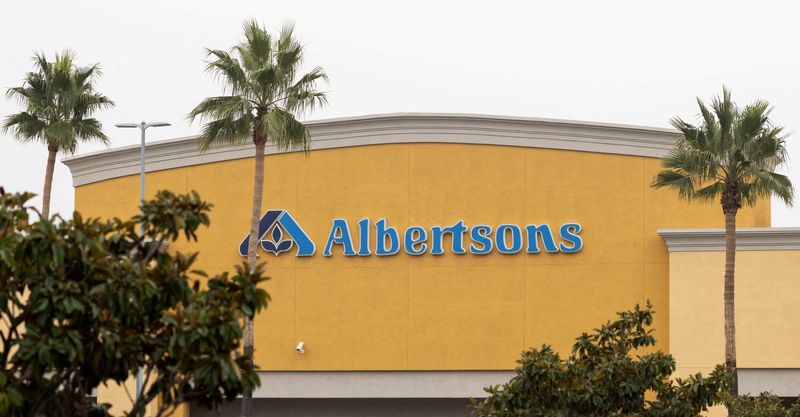Surging grocery prices in focus as US tries to stop Kroger deal By Reuters

By Deborah Bloom
PORTLAND, Oregon (Reuters) – The U.S. Federal Trade Commission argued in federal court on Monday that Kroger (NYSE:)’s $25 billion merger with rival grocer Albertsons (NYSE:) is bad for shoppers in a case that highlights growing alarm over surging grocery prices.
The FTC and several states went to trial in Portland, Oregon, to block the deal, saying it would mean higher prices for consumers and less bargaining power for unionized grocery workers.
FTC Chief Trial Counsel Susan Musser told U.S. District Judge Adrienne Nelson during opening statements in a packed courtroom that it would result in Kroger “swallowing” Albertsons.
“Stopping this multibillion-dollar deal will keep in place the vigorous competition that acts as a check on rising grocery prices and spurs improvements in quality and innovation,” she said.
Kroger attorney Matthew Wolf said in an opening statement that the merger would immediately lower some prices for shoppers at Albertsons, where prices are now 10-12% higher than at Kroger stores.
The FTC’s bid to bring down prices by blocking the deal shows “they neither understand the industry nor the parties within it,” Wolf said.
The merger is necessary, said Wolf, in order for the stores to compete with Walmart (NYSE:) , the largest grocery retailer in the U.S., bulk shopping mainstay Costco (NASDAQ:) and Amazon.com (NASDAQ:), which owns Whole Foods.
Albertsons’ lawyer Enu Mainigi said that Walmart is able to sell certain products at a price lower than the grocery store chain can buy them wholesale, and that a tie-up with Kroger gives Albertsons the best chance to survive.
“It could mean layoffs. It could include closing stores. It may include exiting certain markets altogether. These are the kind of things that are on the table if the merger does not go through,” she said.
The case is a high-profile piece of the Biden administration’s push to lower prices for consumers, and comes as high grocery bills take prominence in the U.S. presidential race.
It is also a key test of FTC Chair Lina Khan’s initiative to use antitrust law to boost wages and mobility for workers.
Kroger attorney Wolf said there is no difference between union wages at Kroger stores that are located near Albertsons stores and those that are not.
The FTC’s Musser said unionized grocery workers secure better pay and benefits by striking at one store and sending customers to a rival. A merger between Kroger and Albertsons would lessen the severity of that threat, she said.
The FTC alleges the merger would harm workers in dozens of labor markets.
“We don’t believe the company’s promise that they are doing this for competition,” said Kim Cordova, president of the United Food and Commercial Workers International Union local in Colorado and Wyoming.
The trial is expected to last around three weeks and feature evidence about competition in the grocery industry.
Kroger and Albertsons say the lawsuit’s focus on traditional supermarkets ignores that consumers typically shop for food at a variety of locations including big-box stores like Target and dollar stores such as Dollar Tree (NASDAQ:).
Kroger has said it will sell 579 of the approximately 5,000 stores it would own if the deal goes through. Part of the trial will focus on whether buyer C&S Wholesale Grocers can successfully run them.
Kroger has also pledged to lower grocery prices by $1 billion after the merger.
Retailers use multiple levers to lower prices, including negotiating better deals with suppliers, investing in automation in the supply chain or changing the way they label and package products.
Although Kroger declined to provide specifics, a source familiar with the matter indicated that the reductions will likely focus on essential and high-demand items first.
Musser said the investment represents only 0.5% of Kroger and Albertsons’ combined total revenue.
Nelson is considering whether to pause the deal while an FTC in-house judge examines how it would impact competition.
Such reviews can take years, and companies often abandon paused deals rather than complete the process.

Arizona, California, Illinois, Maryland, Nevada, New Mexico, Oregon, Wyoming and the District of Columbia have sued alongside the FTC.
Washington and Colorado have filed their own lawsuits to block the merger, which are scheduled to go to trial after the FTC’s case.




